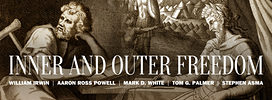I’d like to emphasize again the connection between what William Irwin has labeled inner freedom and external (or political) freedom. I think that the former is better cast as “self-control,” as it focuses on a moral goal and not a metaphysical claim, but I don’t want to quibble about terms, especially when freedom has had a long history of being applied to one’s control over one’s own mind.
There is robust evidence that we are more likely to enjoy more self-control when we are secured in the exercise of our external freedom and are accorded the responsibility that comes with freedom. More complex forms of social coordination based on the presumption of liberty and simple rules to govern our actions (what Richard Epstein termed Simple Rules for a Complex World) tend to involve more, rather than less, self-control, entirely contrary to what our old socialist friends have preached for so long. Complex social organization involves more internalization of rules and guidelines, as Norbert Elias showed in his pathbreaking research.
Denying people the freedom to make their own decisions about their own lives and shielding them from the responsibility for their acts limits or reduces their abilities to make choices for themselves. The history of alcohol and drug prohibition provide substantial evidence, as Jeffrey Miron argues in his chapter from the book Self-Control or State Control: You Decide, but there are many, many other examples to buttress the insight.
That relationship of self-control to freedom and responsibility shows up not only in broadly political decisions made by legislatures or other state bodies to limit or recognize external freedom, but also in parenting, as Greg Lukianoff and Jonathan Haidt argue in their important and disturbing new book, The Coddling of the American Mind: How Good Intentions and Bad Ideas Are Setting Up a Generation for Failure. If we hope to achieve greater inner freedom (aka “self-control”) we should redouble our efforts to extend and secure external (aka “political”) freedom.
Finally, I am not a parent, and generally I refrain from offering advice on parenting. But I did have parents, and I remember that they tried to do what they could to instill respect and self-control in their children. (My father was a reader of Epictetus and Marcus Aurelius.) Based on my memories of my parents and my observations of others, I do not see inner freedom as incompatible with or even in tension with commitments to children. Making oneself aware of one’s obligations and one’s purposes is not incompatible with being connected to others or experiencing or expressing love and commitment to family. It means that one is less likely, when doing so, to engage in self-defeating actions or to let impulses get in the way of what would express love more effectively.
Finally, I recommend to those who are facing choices as parents a project that, to this person lacking experience, seems to be very promising based on the available evidence. That project is LetGrow.org, and I encourage people to explore it.

